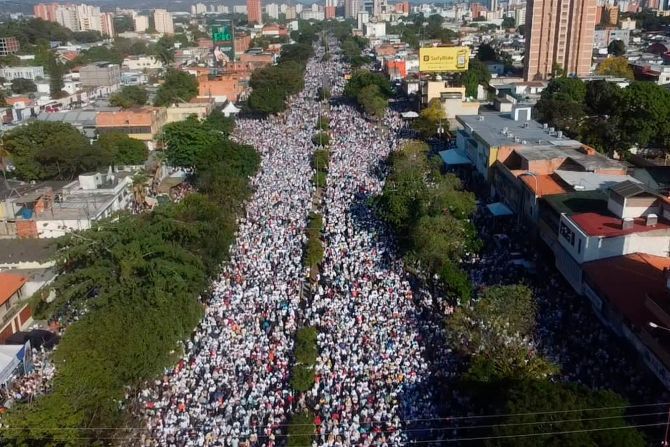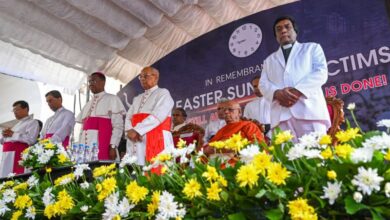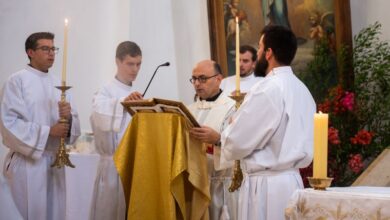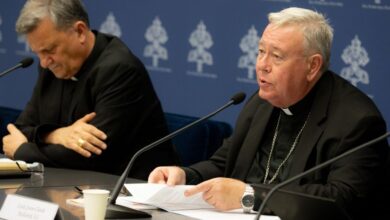Divine Shepherdess procession in Venezuela draws 2.7 million

 Millions of people gathered in the streets of Barquisimeto in Lara state, Venezuela, to accompany the Divine Shepherdess in a Jan. 14, 2024, procession. / Credit: Adolfo Pereira/Lara State Government
Millions of people gathered in the streets of Barquisimeto in Lara state, Venezuela, to accompany the Divine Shepherdess in a Jan. 14, 2024, procession. / Credit: Adolfo Pereira/Lara State Government ACI Prensa Staff, Jan 16, 2024 / 18:00 pm (CNA).
More than 2.7 million people gathered in the city of Barquisimeto in Lara state, Venezuela, on Sunday, Jan. 14, to accompany the image of the Divine Shepherdess Virgin in a procession, reported state governor Adolfo Pereira in post on X.
Pereira commented that there was a very positive atmosphere at the gathering, “where peace, calm, and the religiosity of the people reigned.”
According to catholic.net, the devotion traces back to 1703 in Seville, Spain, when a Capuchin friar saw the Virgin Mary dressed as a shepherdess holding a shepherd’s crook. She was surrounded by some sheep, but one that had strayed was pursued by a wolf, which the Archangel Michael dispatched with an arrow.
The friar commissioned a painting depicting what he saw and began to spread devotion to Our Lady under this avocation, which eventually was carried to Spanish America and to Venezuela in particular.
The image is taken to represent Mary’s role in protecting the flock of her Son from the evil one. “Divine” is taken in the sense of “most excellent.”
This year’s procession began early with the traditional Divine Shepherdess Devotional Race. Approximately 44,000 runners ran the six-mile course, which went past the most iconic places in the city until reaching St. Rose Church, the starting point of the procession.
The image of the Virgin was processed more than four miles throughout the day, from St. Rose Church to the metropolitan cathedral of Barquisimeto, where the archbishop emeritus of Coro, Mariano Parra, celebrated the Mass for the reception of the image.
“It’s no coincidence that this procession has been held 166 times, and every [time] the number of people accompanying the Divine Shepherdess increases, thus becoming one of the largest manifestations [of Marian devotion] in the world,” Parra said in his homily.
The prelate said that God manifests to the Church in Venezuela — through the Divine Shepherdess — what his will is and invited all the faithful to make an effort to know and understand what God wants.
“Mary, under the invocation of the Divine Shepherdess, today asks us — as disciples of her Son — to learn from her: to live only for Christ and at his service. This is our reason for being,” he said.
The archbishop emeritus concluded by asking the Divine Shepherdess “to lead us to her Son, Jesus Christ, and help us to be faithful, to go around the world sowing love, justice, and peace.”
Venezuelan bishops’ commitment in ‘year of grace 2024’
The 121st Ordinary Plenary Assembly of the Venezuelan bishops concluded Jan. 12, during which the prelates analyzed the current national situation and the greatest challenges the new year presents to the country and the Catholic Church.
Following the meeting, the bishops published a pastoral exhortation asking all Venezuelans to work for peace, justice, and fraternal solidarity as well as make an effort that allows “opening doors and building bridges of understanding and coexistence.”
The bishops also called attention to the “urgent national problem” in economic, humanitarian, immigration, education, and corruption matters. “The most serious thing about this situation,” they commented, is “that there is no interest in a solution at the institutional level.”
The prelates called for “a serious, sincere, and committed dialogue and negotiation between the government and the various sectors of national life,” in reference to the presidential elections scheduled for this year in the country.
“Once again we extend our best wishes so that this year 2024, with the effort and participation of each person and all the country’s institutions, we may travel the route of dialogue, encounter, and the type of country that we all want,” the bishops concluded.
This story was first published by ACI Prensa, CNA’s Spanish-language news partner. It has been translated and adapted by CNA.





